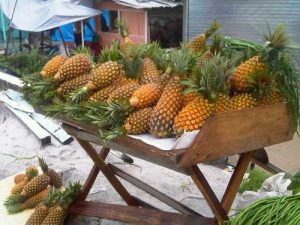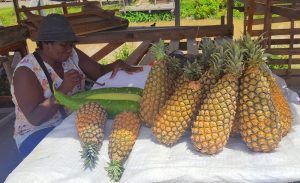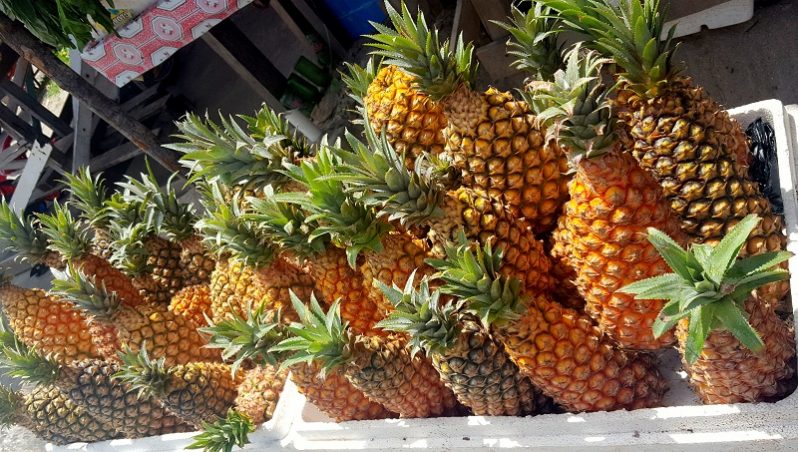By Indrawattie Natram
Its that time of the year when vendors, particularly those living in the Indigenous communities of Capoey and Mainstay/Whyaka in Region Two (Pomeroon-Supenaam), look forward to earn an extra income from the sale of pineapples.
Farmers living within these sandy communities have begun harvesting their crops and according to them this year , there is a bumper crop.

According to farmers from both areas, harvesting of the organic pineapples commenced approximately two weeks ago and despite the rainy weather conditions, they have managed to ensure their “sweet” pineapples are on the stalls at various local markets.
But while there is a large number of pineapples on the market this time around, many vendors related that sales are slow. Many of them can be seen at the Anna Regina market erecting make -shift stalls to sell their pineapples in the day while others opt to stand with umbrellas under the sweltering heat or rainy conditions to market their harvest.
Desire for more markets
“I will say because it’s a season, persons are given many options on who to purchase from and when you visit the market vendors are all over, so I think that is the reason why there is slow sales but of course we would desire more sales so we can go home,” vendor Ingrid Fredericks said.

Fredericks, who was seen selling pineapples at the Anna Regina market annually, said that every year she looks forward to the season to earn extra cash. Fredericks is the mother of five children and would usually harvest pineapples from her brother’s farm.
Pineapple farmer Leslie Dejonge related that he has close to three acres of pineapple at his farm at Mainstay. He is also selling pineapples at the market at Anna Regina.The prices range from $250-300 for a pineapple.
Capoey pineapple farmers related that they only harvest what they would have received orders for. Farmer Evet Alen, who usually sells at the junction where the road to the Capoey Lake and Essequibo Public Road meet , said that her customers are mainly passengers who pass the route daily. She said on a daily basis she brings out approximately 100 pineapples and by noon on most occasions , all are sold.
Pineapple farming within the Region has been the main source of income for persons living in the Indigenous communities. Both communities are located approximately 15 miles from the Essequibo Coast public road.
Over the years, the planting, growth, cultivation and marketing of the tasty fruit has paved the way for community development, advanced educational possibilities, tourism enhancement hence a better life for residents- all through its prosperous returns.
The village of Mainstay/Whyaka has hundreds of acres of pineapples under cultivation. Pineapples were processed by AMAZON CARIBBEAN GUYANA LTD (AMCAR) since 2004 for Europe , however , the collaboration ended in 2014 .
The company , which processed the pineapples and marketed same by the jars , stated at the time that it required a larger volume to sustain its operation. Reports are that a lack of cooperation among farmers led to a breakdown in the agreement the company shared with the village.












